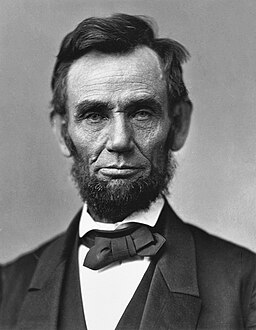
Tennessee is a state located in the southeastern region of the United States. Tennessee is the 36th largest and the 16th most populous of the 50 United States. Tennessee is bordered by Kentucky to the north, Virginia to the northeast, North Carolina to the east, Georgia, Alabama, and Mississippi to the south, Arkansas to the west, and Missouri to the northwest. The Appalachian Mountains dominate the eastern part of the state, and the Mississippi River forms the state's western border. Nashville is the state's capital and largest city, with a 2017 population of 667,560 and a 2017 metro population of 1,903,045. Tennessee's second largest city is Memphis, which had a population of 652,236 in 2017.

The Reconstruction era was the period from 1863 to 1877 in American history. It was a significant chapter in the history of American civil rights.

James Morris Lawson, Jr. is an American activist and university professor. He was a leading theoretician and tactician of nonviolence within the Civil Rights Movement. During the 1960s, he served as a mentor to the Nashville Student Movement and the Student Nonviolent Coordinating Committee. He was expelled from Vanderbilt University for his Civil Rights activism in 1960, and later served as a pastor in Los Angeles, California, for 25 years.

Harold Eugene Ford Sr. is an American politician and Democratic former member of the United States House of Representatives representing the Memphis, Tennessee area for 11 terms—from 1975 until his retirement in 1997. He was the first African-American to represent Tennessee in the U.S. Congress. He is a member of the Ford political family from Memphis.
The Republican Party of Shelby County is the Republican political organization for Memphis and Shelby County, Tennessee. It has a long history of impacting politics in Shelby County long before the Republican Party was popular in the south.
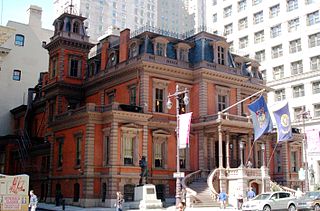
The Union Leagues were quasi-secretive, men’s clubs established during the American Civil War (1861–1865), to promote loyalty to the Union of the United States of America, the policies of newly elected 16th President Abraham Lincoln, and to combat what they believed to be the treasonous words and actions of anti-war, antiblack "Copperhead" Democrats. Though initially nonpartisan, by the war's last year they were in open alliance with the Republican Party, pro-Union Democrats, and the Union military. The most famous of these clubs were formed in Philadelphia, New York, and Boston and were composed of prosperous men who raised money for war-related service organizations, such as the United States Sanitary Commission, which provided medical care to treat Federal soldiers wounded in battle at a time when the military was ill-prepared for the scale of need. The clubs supported the Republican Party with funding, organizational support, and activism. Union Leagues also existed throughout the land which were created primarily by working-class men. By the spring of 1863, these disparate councils were organized under the Union League of America (ULA) organization which was headquartered in Washington DC. Like-minded organizations aimed at the working class were also created in New York which became known as Loyal Leagues. Similar patriotic organizations also existed for women and were known as Ladies Union Leagues.
The Women's Political Council, founded in Montgomery, Alabama, was an organization that was part of the Civil Rights Movement that was formed to address the racial issues in the city. Members included Mary Fair Burks, Jo Ann Robinson, Irene West, Thelma Glass, and Uretta Adair. The WPC was the first group to officially call for a boycott of the bus system during the Montgomery Bus Boycott, beginning in December 1955. The group led efforts in the early 1950s to secure better treatment for Black bus passengers, and in December 1955 it initiated the thirteen month bus boycott. They helped organize communications to get it started, as well as to support it, including giving people rides who were boycotting the buses. The African Americans of Montgomery upheld the boycott for more than a year.
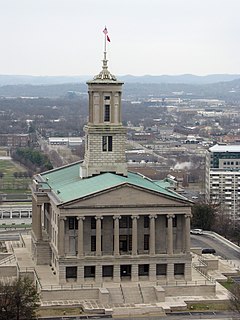
Tennessee is one of the 50 states of the United States. It was admitted to the Union on June 1, 1796, as the 16th state.
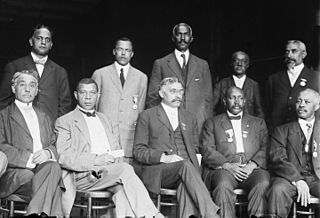
The National Negro Business League (NNBL) was an American organization founded in Boston in 1900 by Booker T. Washington to promote the interests of African-American businesses. The mission and main goal of the National Negro Business League was "to promote the commercial and financial development of the Negro." It was recognized as "composed of negro men and women who have achieved success along business lines". It grew rapidly with In 320 chapters in 1905 and more than 600 chapters in 34 states in 1915.

The Memphis sanitation strike began in February 1968 in Memphis, Tennessee. Following years of poor pay and dangerous working conditions, and provoked by the crushing to death of workers Echol Cole and Robert Walker in garbage compactors, over 700 of the 1300 black sanitation workers met on Sunday, February 11, and agreed to strike. They then did not turn out for work on the following day. They also sought to join the American Federation of State, County, and Municipal Employees (AFSCME) Local 1733. The sanitation strike was also the reason for Martin Luther King Jr.'s presence in Memphis, where he was assassinated.
Memphis, Tennessee is governed by a mayor and thirteen city council members. Since 1995, as a result of a legal challenge, all council members are elected from nine geographic districts. Seven are single-member districts and two have three representatives each.
"I've Been to the Mountaintop" is the popular name of the last speech delivered by Martin Luther King Jr.
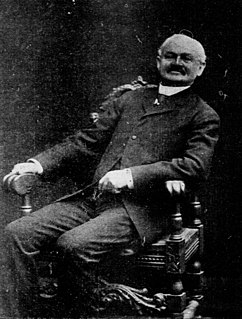
Robert Reed Church Sr. was an African-American entrepreneur, businessman and landowner in Memphis, Tennessee, who began his rise during the American Civil War. He was the first African-American "millionaire" in the South. His total wealth probably reached $700,000, not a round million. Church built a reputation for great wealth and influence in the business community. He founded Solvent Savings Bank, the first black-owned bank in the city, which extended credit to blacks so they could buy homes and develop businesses. As a philanthropist, Church used his wealth to develop a park, playground, auditorium and other facilities for the black community, who were excluded by state-enacted racial segregation from most such amenities in the city.
The civil rights movement (1865–1896) was aimed at eliminating racial discrimination against African Americans, improving educational and employment opportunities, and establishing electoral power, just after the abolition of Slavery in the United States. This period between 1865 and 1895 saw tremendous change in the fortunes of the black community following the elimination of slavery in the South.
Ell Persons was an African-American man who was lynched on 22 May 1917, after he was accused of having raped and decapitated a 15-year-old white girl, Antoinette Rappel, in Memphis, Tennessee, United States. He was arrested and was awaiting trial when he was captured by a lynch party, who burned him alive and scattered his remains around town, throwing his head at a group of African Americans. A large crowd attended his lynching, which had the atmosphere of a carnival. No one was charged as a result of the lynching, which was described as one of the most vicious in American history, but it did play a part in the foundation of the Memphis chapter of the National Association for the Advancement of Colored People (NAACP).
Lewis Ossie Swingler was a pioneering African-American journalist, editor, and newspaper publisher from Crittenden County, Arkansas. He was editor of the Memphis World and editor in chief and copublisher of the Tri-State Defender.
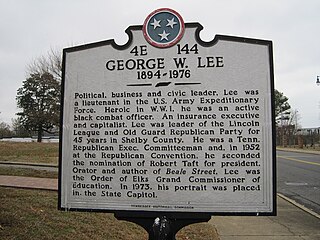
George Washington Lee was an African-American soldier, author, political leader and corporate executive.

Henry Lincoln "Linc" Johnson was an American attorney and politician from the state of Georgia. He is best remembered as one of the most prominent African-American Republicans of the first two decades of the 20th century and as a leader of the dominant black-and-tan faction of the Republican Party of Georgia. He was appointed by President William Howard Taft as Recorder of the Deeds for the District of Columbia, at the time regarded as the premier political patronage position reserved for black Americans.
Maxine (Atkins) Smith born in Memphis, Tennessee, United States, was an academic, civil rights activist, and school board official.

